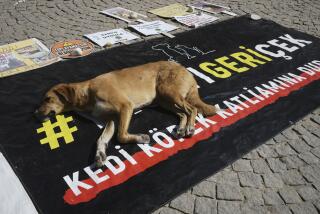Turks Struggle to Balance Islamic Heritage With Needs of a Secular State : Turkey: Government seeks to regulate and control fundamentalism amid concerns for the survival of tolerance.
- Share via
ISTANBUL — When it comes to finding a job, Fatma Bostan, a graduate student studying public administration at Turkey’s elite Bosphorus University, should not have a problem.
Well-educated and fluent in English, this 25-year-old woman seems to offer most of the skills a potential employer would want.
But there is one problem: In accordance with Islamic law, not a wisp of hair peeks out of the scarf well-wrapped around her head and neck, and over her clothes she wears a long, loose coat.
“People look at me and are scared, and I know it won’t be easy for me to be hired,” said the soft-spoken woman. “But society can’t break people from their past, and I believe the Koran tells the truth about the way I must live. One day, I think it will be the same for everyone in Turkey.”
Bostan’s predicament exemplifies Turkey’s struggle with its religious heritage. Ever since 1923, when Mustafa Kemal Ataturk led the shift to a secular state, Turkey has managed to strike a balance between its religious values and a Western-style political system. But it is this very balance that many Turks now believe is in danger, and they point to people like Bostan as proof of this.
“What I am frightened of is that in 10 years, Islamic students who have been able to flourish precisely because of our tolerant atmosphere will be in power and they will be there to actually suffocate this tolerance,” said a professor at Bosphorus University who asked that her name not be used.
Although few people believe Turkey is in imminent danger of an Islamic revolution, analysts point to a trend of greater agitation by Islamic groups in the past year. Four prominent secularists have been murdered.
In early September, Turan Dursun, a religious scholar well-known for his critical writings on Islam, was killed after receiving hundreds of death threats. His murder followed those of Muammar Aksoy, a law professor and chairman of the Assn. of Kemalist Thought (named after Ataturk), and Cetin Emec, a columnist and former editor at Hurriyet, a leading newspaper. Emec, before his death, had written articles critical of Islamic activities.
All three of the murders are presumed linked to Islamic fundamentalists, though police have not pinpointed suspects. Tehran Radio reportedly referred to Emec as the “Turkish Salman Rushdie.”
But few people believe Iran was behind Dursun’s murder, or the others. Instead, they question Turkish government policies that, while not actively promoting Islam, tacitly permit fundamentalist activities to flourish.
The opposition Social Democratic Populist Party has launched an investigation into anti-secular activities within government agencies, focusing on the interior and education ministries.
“There are certain violations by certain public sector groups and we need to study the dimensions of the threat,” said a government spokesman who did not want to be identified. “We have always had certain groups interested in having a religious state in Turkey and now the question is: Have they really become stronger and more influential?”
Liberals and Islamicists make up the two main wings of the ruling Motherland Party with the latter in the majority, said Gencay Saylan, a writer specializing in Islamic issues.
“New recruits to the police force are coming from Islamic circles,” he said. “Universities are filled with Islamic-oriented professors. Islamic banks are flourishing under special tax exemptions. I am very worried about these things and about the new politically aware Islamic movement that is developing.”
Successive governments have tried to regulate and control the spread of Islamic fundamentalism by establishing state-run religious schools and courses in the Koran, while maintaining a penal code that forbids activities that undermine the country’s secular base.
The breakdown in the balance between Islam and secularism can be traced to a coup in 1980.
The generals who ruled Turkey until 1983 promoted Islam as an alternative to leftist ideologies then flourishing, instituting compulsory religion courses for schoolchildren, said Ugur Mumcu, a journalist who has reported on Islam’s growing power.
This opened the door to Saudi Arabian funding of hundreds of religious schools and organizations.
“It’s impossible to specify the full extent of such organizations, because they don’t announce who they are and they hide behind names that don’t sound religious,” Mumcu said. “But religious groups are getting stronger and are posing a threat to the security of the state.”
In a country whose population is 99% Muslim, a recent poll found that 80% of Turks surveyed fasted during the Ramadan holiday, 62% considered themselves religious, and 54% believed a woman should cover herself up.
Analysts say Islamic fundamentalism in Turkey is also fueled by the country’s economic problems--annual inflation is about 60% and unemployment is 15% to 20%.
“Because of the pace of social change, people have started looking for a new solution, which fundamentalism offers,” Saylan said. “That’s the internal dynamics. Externally, you have Saudi Arabia, and it’s very important for Saudi Arabia to use Islam as a power tool in the world.”
More to Read
Sign up for Essential California
The most important California stories and recommendations in your inbox every morning.
You may occasionally receive promotional content from the Los Angeles Times.













